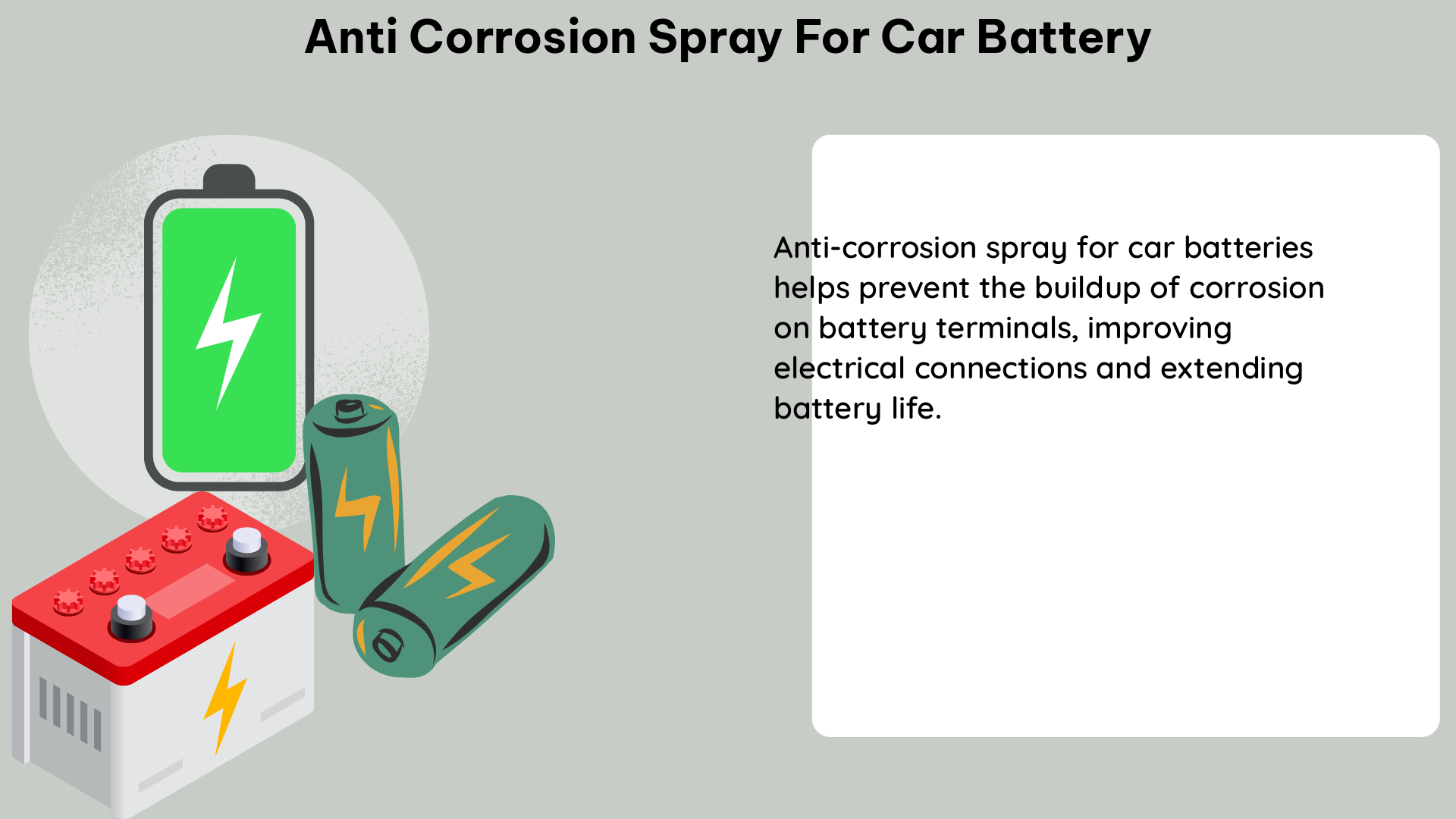Anti-corrosion sprays for car batteries are essential for maintaining the health and longevity of your vehicle’s power source. These specialized products contain corrosion-inhibiting chemicals that prevent the buildup of the greenish-white powder commonly seen on neglected battery terminals, which can lead to various electrical issues and reduce the battery’s lifespan.
Understanding Corrosion on Car Batteries
Corrosion on car battery terminals is a common problem that can be caused by a variety of factors, including:
- Exposure to Moisture: The battery terminals are constantly exposed to moisture, whether from the environment or from the battery itself, which can lead to the formation of corrosive compounds.
- Road Salt and Chemicals: During the winter months, the use of road salt and other de-icing chemicals can accelerate the corrosion process on the battery terminals.
- Sulfation: Over time, the lead-acid battery can undergo a process called sulfation, where lead sulfate crystals form on the battery plates, reducing the battery’s capacity and increasing the risk of corrosion.
- Overcharging: Excessive charging can also contribute to the formation of corrosive compounds on the battery terminals.
The Benefits of Using Anti-Corrosion Spray

Using an anti-corrosion spray for your car battery can provide several benefits, including:
- Increased Battery Lifespan: By preventing the buildup of corrosive materials on the battery terminals, anti-corrosion sprays can significantly extend the lifespan of your car battery.
- Improved Electrical Performance: Corrosion on the battery terminals can interfere with the flow of electrical current, leading to various electrical issues, such as starting problems, dimming headlights, and malfunctioning accessories. Anti-corrosion sprays help maintain optimal electrical performance.
- Reduced Maintenance: With regular use of an anti-corrosion spray, you can minimize the need for frequent battery terminal cleaning and maintenance, saving you time and effort.
- Enhanced Safety: Corrosion on battery terminals can pose a safety risk, as it can lead to short circuits and even battery explosions. Anti-corrosion sprays help mitigate these hazards.
Types of Anti-Corrosion Sprays
There are several types of anti-corrosion sprays available for car batteries, each with its own unique properties and benefits:
-
Silica-Thickened Synthetic Grease: Products like NyoGel® 760G are silica-thickened, medium-viscosity synthetic hydrocarbon greases that exhibit excellent water spray resistance and provide lifetime lubrication for lasting connections. These greases have been tested to pass 30-day salt spray and cyclic corrosion testing on both nickel brass and tin copper terminals.
-
Dielectric Grease: Dielectric grease is a popular choice for protecting battery terminals, as it can be used on both positive and negative posts/terminals. This type of grease helps keep corrosion build-up to a minimum, if any.
-
Petroleum Jelly: While not as specialized as the previous two options, petroleum jelly (also known as Vaseline) is a simple and effective solution for preventing corrosion on battery terminals.
Applying Anti-Corrosion Spray Correctly
When applying an anti-corrosion spray or grease to your car battery terminals, it’s essential to follow these steps to ensure optimal results:
- Clean the Terminals: Before applying the anti-corrosion product, thoroughly clean the battery terminals to remove any existing corrosion or buildup. Use a wire brush or baking soda and water solution to clean the terminals.
- Apply the Product Carefully: Apply a thin, even layer of the anti-corrosion spray or grease to the battery terminals, being careful not to let the product get in between the terminal and the post. This can cause intermittent cranking or other electrical issues.
- Use Terminal Caps: Consider using terminal caps to minimize the amount of dirt and debris that can cling to the anti-corrosion coating, further enhancing its effectiveness.
- Reapply as Needed: Depending on the product and the environmental conditions, you may need to reapply the anti-corrosion spray or grease periodically to maintain its protective properties.
Choosing the Right Anti-Corrosion Spray
When selecting an anti-corrosion spray for your car battery, consider the following factors:
- Corrosion Protection: Look for products that have been tested and proven to provide effective protection against various types of corrosion, such as salt spray and cyclic corrosion.
- Compatibility: Ensure that the anti-corrosion spray is compatible with your specific battery type and terminal materials (e.g., nickel brass, tin copper).
- Ease of Application: Choose a product that is easy to apply and doesn’t require extensive preparation or cleanup.
- Longevity: Select a product that can provide long-lasting protection, reducing the need for frequent reapplication.
- Safety: Opt for anti-corrosion sprays that are non-toxic and environmentally friendly.
Conclusion
Maintaining the health of your car battery is crucial for the overall performance and reliability of your vehicle. By using an effective anti-corrosion spray, you can significantly extend the lifespan of your battery, improve its electrical performance, and reduce the need for frequent maintenance. With the right product and proper application, you can enjoy a worry-free driving experience and avoid the hassle of unexpected battery-related issues.
References:
– The Hull Truth – Corrosion Spray for Battery Terminals
– Reddit – Red Stuff All Over My Battery
– Mechanics Stack Exchange – Do Battery Corrosion Pads Really Work?
– Bob Is The Oil Guy – Do You Believe in That Red Battery Anti-Corrosion Spray?
– NYE Lubricants – Case Study: Battery Terminal

The lambdageeks.com Core SME Team is a group of experienced subject matter experts from diverse scientific and technical fields including Physics, Chemistry, Technology,Electronics & Electrical Engineering, Automotive, Mechanical Engineering. Our team collaborates to create high-quality, well-researched articles on a wide range of science and technology topics for the lambdageeks.com website.
All Our Senior SME are having more than 7 Years of experience in the respective fields . They are either Working Industry Professionals or assocaited With different Universities. Refer Our Authors Page to get to know About our Core SMEs.